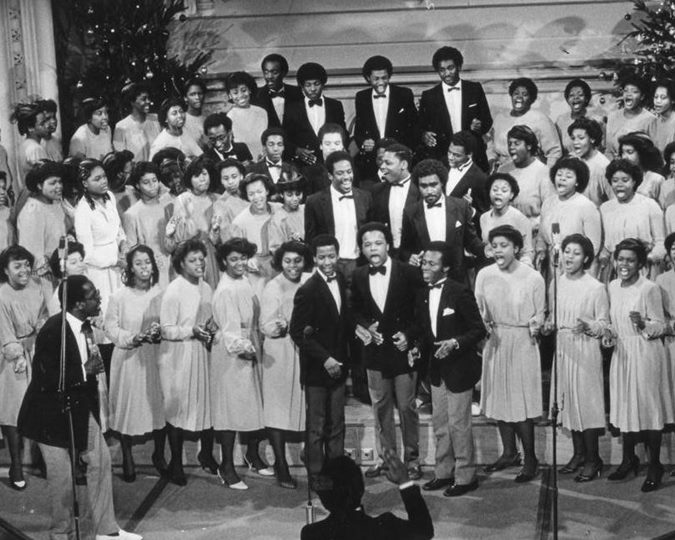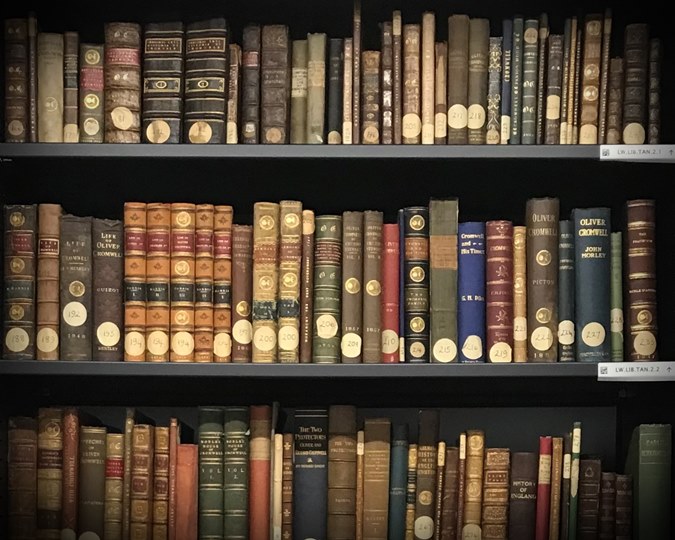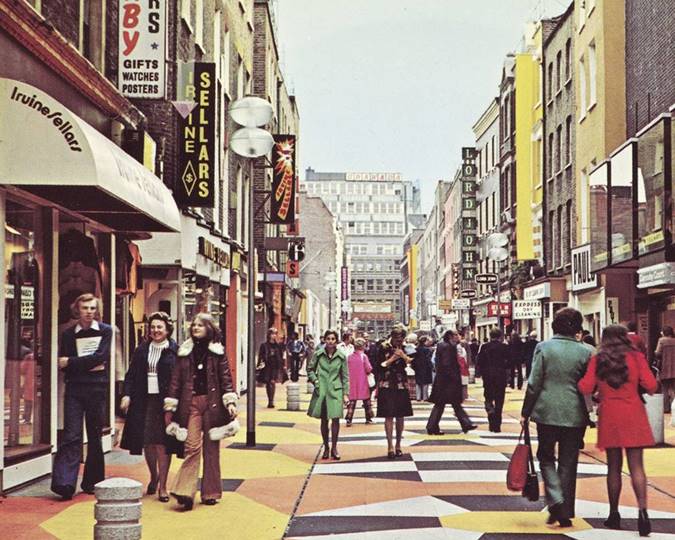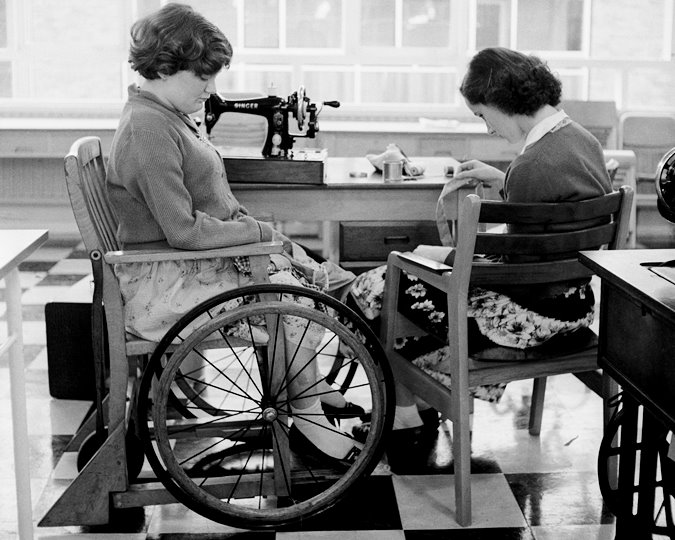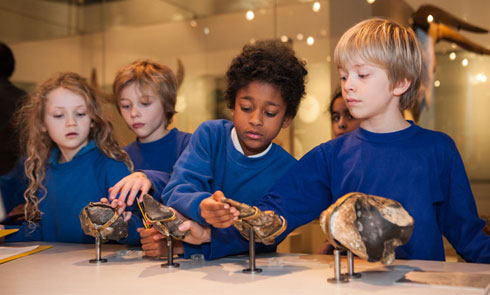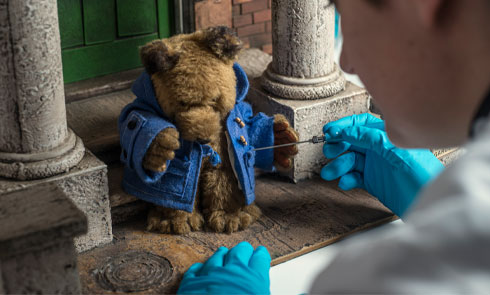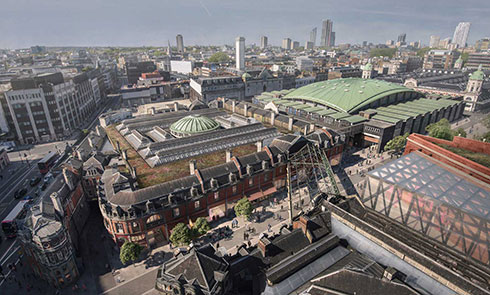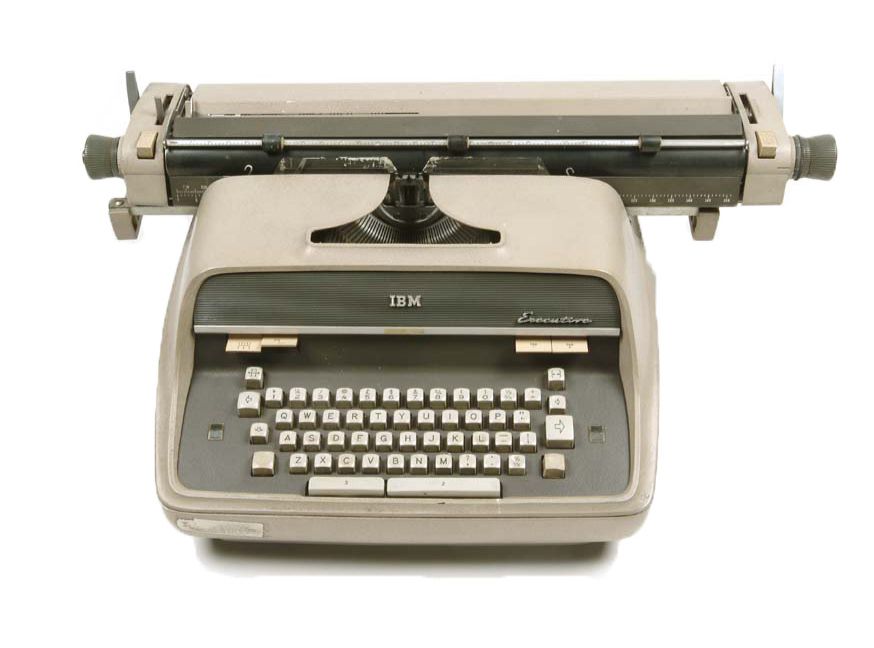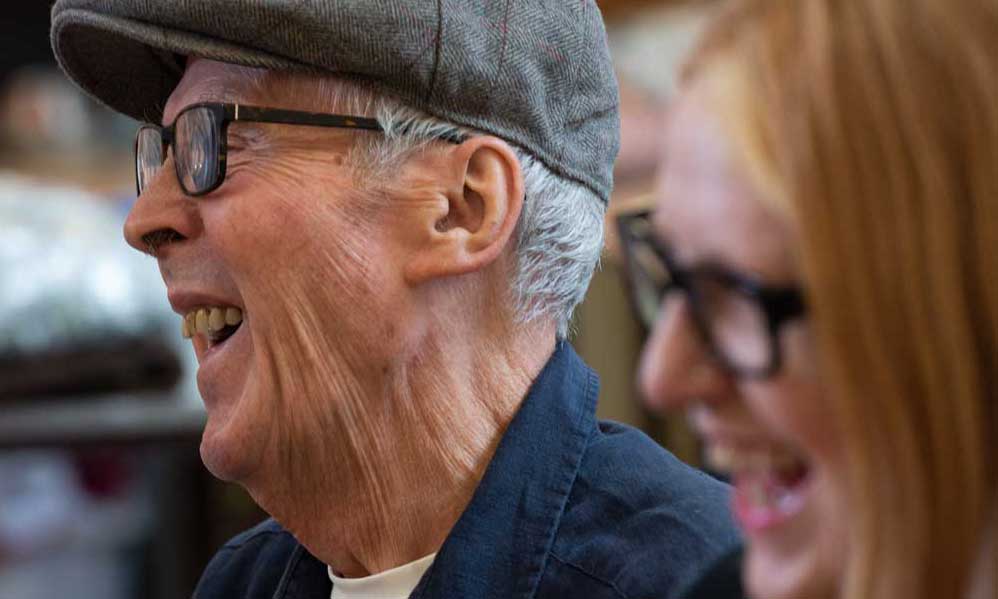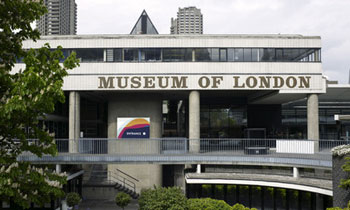- Creative & Connected – January 2021
- Creative & Connected – December 2020
- Creative & Connected – November 2020
- Creative & Connected – October 2020
- Creative & Connected – September 2020
- Creative & Connected – August 2020
- Creative & Connected – July 2020
- Creative & Connected – June 2020
- Creative & Connected – May 2020
London Lives: Whispers in the Museum
This episode of our London Lives podcast series centres around the diverse world of work in London. As a family explore the Museum of London, voices call out to them, eager to share stories of their working lives in the city and beyond.
The podcast
In this episode of London Lives, storyteller Mara Menzies tells an enchanting tale of one family’s visit to the Museum of London. As they wind through the galleries, marvelling together at familiar tools and uniforms, they find a solitary object. Whispers of the past grow louder. Inspired by an IBM electric typewriter held in the Museum of London collection, we hear from Helena, Derek and Hubert about their rich and diverse working lives in London. We invite you to listen in wonder and consider your own working lives.
Click on the white arrow in the orange circle below to play this episode.
With great thanks to Derek and John from Russia Lane Day Centre , Hubert from Ashford Place , and Helena and Jacqui from Nightingale Hammerson Care Home for permission to share their stories.
The transcript
[Podcast begins]
Hello everyone and welcome to our podcast, London Lives. My name is Mara Menzies and I am a storyteller. And one of the reasons that I love my job is because it allows me to both hear and share some incredible stories, and this podcast is all about stories. Marina and Amy from the Museum of London asked me if I could create a story inspired by the theme of work. They gave me some images, including one of an IBM electric typewriter. Perhaps some of you listening to this used to work with one yourselves? I can imagine the clickety clack of the keys. I also listened to some lovely interviews with three wonderful people – Derek, Hubert and Helena – who all spoke about their experiences of work.
I took all these things and began to weave them together, creating a story. As you listen to it, it may bring back some memories. Maybe you have lived a similar life to the people in this story, or maybe the stories will make you think of yours. What kinds of things did you get up to at work?
There are often magical words at the beginning of a story. The second you hear them, you know that you are going somewhere different – somewhere special. Here we go…
[00:01:27]
Once upon a time, there was a family. They wanted to have a day out together and decided to visit the Museum of London, so that they could learn about all the wonderful things that had existed in the past. It was a cold November day, but luckily for them it was dry and pleasant. Everywhere they looked, they saw the trees reaching their skeletal, finger-like branches up into to the sky. The last of the autumn leaves tumbled gently to the ground, creating a thin red, orange, and brown carpet beneath their feet. They climbed the stairs that led to the entrance of the museum and in they went.
[00:02:07]
[BUSTLING]
They were greeted warmly and given a map so they could easily find their way around. The museum was full of glass cabinets containing weird and wonderful objects. The little boy in the family was full of questions.
‘What’s that?!’ he asked, looking at a long-handled tool. His mother told him that it was used by glass makers to make beautiful vases and trinkets and to handle the burning liquid glass.
‘What’s that?!’ he asked. ‘It’s an astronaut’s helmet, isn’t it?’ They peered at the object, which looked to be made of metal.
[METAL BEING BANGED TWICE AND REVERBERATING]
It had a big hole at the front and holes at the side.
‘Oh, no,’ said his dad. ‘The person who wore this, did not go up into space. They went deep down into the sea.’
[BUBBLING LIQUID]
‘It’s a diver’s helmet.’ The boy was delighted.
The little girl in the family raced over to examine a terrifying-looking hook.
‘Ooh, what was that used for?’ Her grandmother came over and smiled broadly.
‘It was used by the dockworkers. Your granddad used to work at the dock and he would use that dockworker’s hook to lift the heavy cargo on and off the ship. It was very hard work!’
The girl was impressed, and beamed up at her granddad who looked very proud of himself. She knew her granddad must have been a very strong and brave man.
[00:03:38]
The family walked through the museum ‘oohing’ and ‘ahhing’ at everything they saw. Granddad was surprised to see a bowler hat from the 1960s sitting on a shelf.
‘Oi! What’s that doing in there?’ he asked. ‘It doesn’t belong in a museum!’ And perhaps he was right, for there, perched on his head, was a very similar hat. Everyone laughed.
They reached an exhibit and grandma became very excited.
‘Oh wow! My mother used to have one of these,’ she gasped. And there, in front of them, was a long white pinafore with a red cross on it, over a long-sleeved blue blouse. Grandma reached her hand out as if to touch it.
‘My mother was a volunteer with the British Red Cross during the war, and this is a VAD uniform that all the volunteer nurses wore.’ Grandma started to tell lots of stories about what she had seen and heard.
[00:04:34]
After an hour had passed, they found themselves in a room that was quite empty, save for one single glass cabinet, right in the centre. They felt a strange breeze sweep over them.
[WHOOSH SOUND]
They walked towards the cabinet, but there was only one object inside. It was a typewriter. An electric typewriter. The boy and the girl had never heard of a typewriter before. They were used to touch screens and laptops. And suddenly, the lights in the room began to flicker.
[ELECTRONIC BEEPING]
And they heard a strange tapping sound. As they looked closer, they saw that, even though the typewriter was not plugged in, it was busy typing away.
[TYPEWRITER KEYS TAPPING]
The breeze blew through the room,
[WHOOSH SOUND]
accompanied by a tiny whispering and chattering. A thousand tiny voices, struggling to be heard, one over the other.
[TYPEWRITER KEYS CONTINUE AND WHISPERING]
‘My story! My story! My story!’ 'Til finally, one voice could be heard over all the others…
[00:05:41]
Hubert:
Well, um, we heard about this great London. And uh, also. At that time our – the governor of Jamaica was Sir Hugh Foot. And we call it then the 'mother country' – that was what we were told – it was the 'mother country'. So, everybody was excited to come to see what the 'mother country' looks like.
Mara:
It was a man named Hubert. Hubert had come all the way from Jamaica and had settled in the great city of London. He was a man of adventure, having lived in different places. He was a man who had worked hard all his life. A man who loved to travel, take risks, try new things. He was a man who had lived many different lives.
Hubert:
We were planting tobacco and reaping it. It was all Americans, but most of the workers were Caribbeans.
Sally:
They came from the Caribbean…
Hubert:
And some Puerto Ricans. Yeah.
[00:06:56]
Mara:
As Hubert recounted some of the adventures of his life, the family listened in awe.
Then, all of a sudden, the whispering began again, desperate to be heard over the clickety clack of the typewriter keys.
[TYPEWRITER KEYS TAPPPING AND WHISPERING]
‘My story! My story! My story!’
The voice of a woman slowly began to fill the air. Who was she, the family wondered? What did she look like? What kinds of things did she like to do? The children wondered what her favourite toys were. She spoke her name.
[00:07:32]
Helena:
My name’s Helena Hinda Phillips.
Jacqui:
I didn’t know you have a middle name, Hinda? Where did that come from?
Helena:
That’s right, when I was born they gave me a Jewish name and an English name.
Jacqui:
Hinda? Oh, I’ve never heard that one before. It’s lovely!
Helena:
It’s quite nice, isn’t it? Unique!
Jacqui:
Yeah.
[00:07:55]
Mara:
Helena told them stories of her childhood. It was as if she could read the minds of the children as she told them of the toys she played with as a young girl. And of course, all young girls have dreams.
Helena:
I wanted to be a nurse. I worked in a nursery in Beaumont Square. Yes, I used to work in this nursery with the children.
Jacqui:
Did they have many toys in the nursery?
Helena:
Yes, they had plenty of toys in the nursery.
[00:08:26]
Mara:
Helena told them stories of playing ball and skipping with her friends. She spoke of meeting her husband at a dance, and of course how, once he had caught her eye, he had fallen head over heels in love with her! Grandma and granddad smiled at each other. Their story had been quite similar.
Helena spoke of the work that she had undertaken.
[00:08:51]
Helena:
I wanted to go into hospital to be a nurse. I was too young. They said I should go and work in the pharmacy until I was 17, 'til I became the right age.
Jacqui:
So how old were you when you left school?
Helena:
I was 14.
Jacqui:
Yeah. Quite common then, wasn’t it?
Helena:
Yeah. I can remember that. Yes, he went into Selfridges and I went into work in the hospital.
Jacqui:
Did you ever shop in Selfridges?
Helena:
Yes, my husband got a special…
Jacqui:
He got a discount?
Helena:
Which I liked!
Jacqui:
I bet!
[LAUGHTER]
[00:09:33]
Mara:
The children were shocked to hear that she had left school at 14! They didn’t think their parents would ever let them do that. They had lots of questions. Then suddenly, the air was filled once more with chattering and the familiar clickety clack of the keys.
[TYPEWRITER KEYS TAPPPING AND WHISPERING]
‘My story. My story! My story!’
[00:10:00]
Derek:
My dad worked at the bank.
John:
Yeah?
Derek:
Westminster Bank in the West End.
John:
Yeah?
Derek:
So, he didn’t get a lot. My mum didn’t work… I think she did do work, but I don’t think a full day.
John:
Hmm?
Derek:
I remember she did work; she done cleaning and different jobs.
John:
Yeah?
Derek:
Half a day cleaning and…
John:
Good.
Derek:
Yeah, she did work, my mum. Half a day or a day in Bethnal Green.
John:
I think people had to do what they could just to get by, Del. Didn’t they?
Derek:
Yeah. As I say, we didn’t get lots of money in them days, did ya?
[00:10:38]
Mara:
The man’s name was Derek and the children understood what he was talking about. They knew that London was a very expensive city; their mum and dad complained about it all the time!
[♪ GENTLE GUITAR MUSIC ♪]
They remembered the people that they saw every day: bus drivers, nurses, police officers, gardeners weeding the flowerbeds, business people rushing here and there, musicians busking on the tube. They began to understand that there were so many different jobs to be had by all the people living in the city, and just then, Derek revealed his favourite job of all.
[00:11:17]
John:
Do you remember what job you ended up doing?
Derek:
Yeah, the bakery.
John:
In the bakery.
Derek:
Cleaning tongs... Bake?
John:
Yeah, so when you were making your cakes, what was the best thing to make?
Derek:
Oh, I think… I liked a few, but jam tarts. These were the ones I’d always want. Jam tarts – y’know, them. Fruit pies.
John:
Oh, I love a fruit pie!
Derek:
I loved the fruit pies – the square ones, y’know.
John:
Yeah, nice!
Derek:
Like strawberry, and stuff like that.
John:
How about apple pies?
Derek:
Umm, Christmas cakes we made at Christmas and all.
John:
Yeah. Mmm.
Derek:
All cakes like that – all the Christmas ones. Logs.
John:
Yule logs with the chocolate over them?
Derek:
Chocolate logs. Yeah, we made all them for Christmas.
John:
Excellent.
Derek:
Mince pies…
[00:12:30]
[WHISPERING OF MULTIPLE VOICES, GRADUALLY FADING]
Mara:
They could have listened to stories all through the night. But just then, the voices began to fade away. Quieter and quieter… Until there was silence in the room. It was time for the museum to close.
They headed for the exit, talking about all that they had seen and heard. And we can never tell how much stories inspire us, but the family decided that the best way to end the day was to stop off at the baker's, and, just like Derek, they enjoyed a delicious jam tart on the way home.
[00:13:24]
So, there we have it. My tale is told. I wonder what things sprang to mind. I wonder if it made you think of the work that you used to do? Did you do any of the jobs mentioned in the story? What was your main job? Perhaps you didn’t want to work at all and would have preferred to stay at home. Perhaps you were desperate to get into the workplace? Did you ever find your dream job and what was the best thing about your work? We’d love to know.
You can email us at [email protected]. That’s [email protected].
[00:14:08]
[♪ GENTLE GUITAR MUSIC ♪]
It’s time for me to go now. I do hope that you enjoyed the story. This week’s podcast was inspired by the stories of Hubert, Helena, and Derek, and of course the trusty IBM electronic typewriter at the Museum of London. When you next visit there, keep an eye out for some of the artefacts mentioned in the story. They’re all there, plus a whole load more! Thank you so much for listening. I’ve been Mara Menzies, and I’ve really enjoyed spending this time with you. Bye for now!
[♪ GENTLE GUITAR MUSIC CONTINUES♪]
[00:15:08]
[Podcast ends]
Creative & Connected
This podcast is just part of November's creative activities for people affected by dementia, their carers and loved ones. You can find the rest of this month's content here: Creative & Connected - November edition

